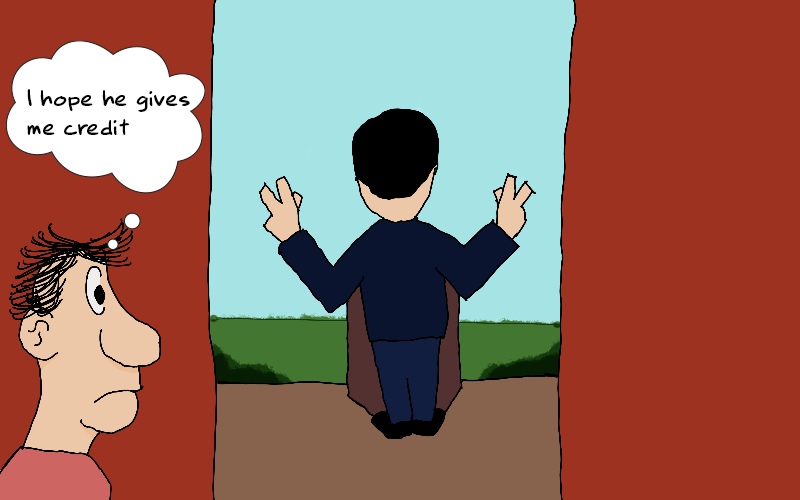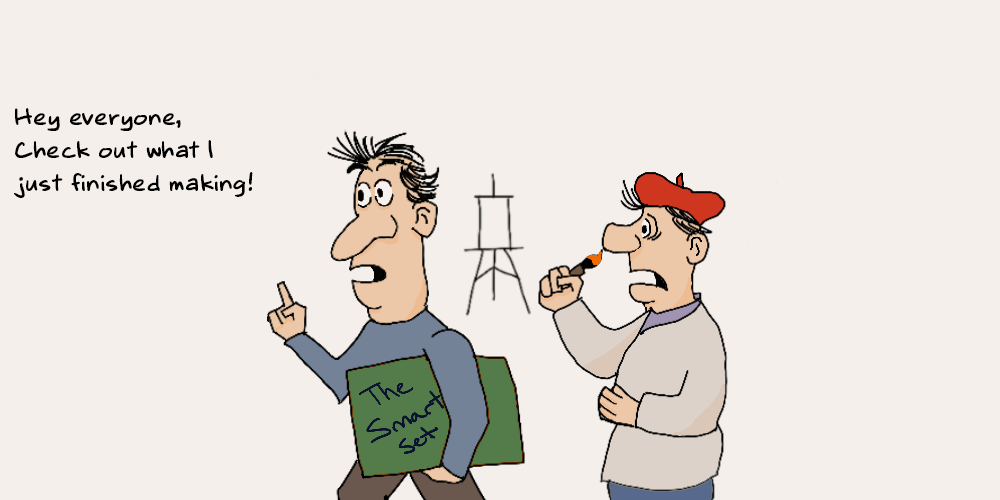I have plagiarized the plagiarists of Sterne, who plagiarized Swift, who plagiarized Reboul, who plagiarized Guillaume des Autels, who plagiarized Rabelais, who plagiarized Morus, who plagiarized Erasmus, who plagiarized Lucian — or Lucius of Patras or Apuleius — for you can’t tell which one of these three stole from the other two.
Charles Nodier, The Bulletin du Bibliophile et du Bibliothécaire (Paris, 1835)
Full disclosure: the titles of this essay were plagiarized. I cribbed one from Sir Philip Sidney’s essay, An Apology for Poetry (1595), and I filched the other from an essay of the same title published in 1998 by Anne Fadiman, who in turn took her title from one of the translations of Ecclesiastes. Sidney’s work has long been in the public domain, so I’m safe on that score. But I’m not expecting a call from the legal staff at Farrar, Strauss, and Giroux, because Anne Fadiman isn’t the only writer who thought that those five words, commonly attributed to Solomon, were too nifty to pass up. “Nothing new under the sun” appears in published writings by Chaucer, Anne Bradstreet, Thomas Jefferson, Ambrose Bierce, a Missouri band called Coalesce, and David Boleson in a blog titled, appropriately, “Nothing New Under the Sun and the Cannibalization of Ideas.”
I have often heard people say that plagiarism is the cardinal sin for writers, the wrongful seizure of something unique and intimately personal. “Who steals [my] words, said the poet Neal Bowers, “steals breath and pulse and consciousness.” But despite such lofty proclamations (not to mention dire warnings from teachers), there are scores of proofs that published authors, more often than not famous ones, have had few scruples when it comes to committing literary larceny. “Authors are like privateers,” claimed Samuel Johnson, “always fair game for one another,” and the roll call of literature’s best and brightest seems to bear him out. Virgil stole from Ennius and was proud of it. Shakespeare’s famous and lengthy description of Cleopatra — it begins, “the barge she sat in, like a burnished throne”—was lifted almost word-for-word from Sir Thomas North’s translation of Plutarch’s Lives of the Noble Greeks and Romans. Milton filched from Masenius, Sterne copied from Burton, and Poe (who himself railed against the “sickening spectacle . . . of the plagiarist”) stole from Benjamin Morrell. Coleridge dumped large amounts of Kant, Schelling, and Schlegel into his Biographia Literaria. Melville weighted down the manuscript of Moby Dick with huge chunks of quasi-scientific prose on whales penned originally by now-forgotten authors like Thomas Beale, William Scoresby, and Frederick Bennett, and Scott Fitzgerald grabbed his wife Zelda’s diary and copied parts of it in his novel, The Beautiful and Damned.
I concede that in most of these cases we can overlook the plagiarism because the copy is so much better than the original. When asked why he bothered to riffle through the work of a lesser poet, Virgil said he was “plucking pearls from Ennius’s dunghill,” and more than 80 generations of poetry lovers have excused him for doing so. Henry Fielding had much the same proprietary attitude toward other writers’ words; so did John Dryden, Lawrence Sterne, and Alexandre Dumas, père, who saw in the act of plagiarism a heroic personal will to dominate. “The man of genius,” Dumas wrote, “does not steal. He conquers, and what he conquers he annexes to his empire.” T. S. Eliot agreed, arguing in The Sacred Wood that “mature” poets were justified in their thievery because whatever they stole, they made better by virtue of their intrinsic poetic superiority. “The good poet,” Eliot said, “welds his theft into a whole of feeling which is unique, utterly different from that from which it was torn.” (For those unlucky poets whose words are commandeered, arguments like Eliot’s must seem cold comfort. I might as well wish for my Subaru to be stolen by NASCAR’s Kyle Busch just so it could be driven by more capable hands.)

Earlier societies were characteristically more tolerant of plagiarism, and I say with some nostalgia that they may have been more sensible about it than we are. Few may have known, much less cared, when Shakespeare recycled Plutarch — the word “plagiarize” does not appear in English until 1621 — but it is obvious that centuries of copyright laws and college honor councils have done little to deter writers from grazing on the literary commons. In April 2006, The Harvard Crimson drew attention to the numerous plagiarisms in Kaavya Viswanathan’s popular novel, How Opal Mehta Got Kissed, Got Wild, and Got a Life; in 2008; Michael O’Neill, a Bush nominee for the Federal District Court in Washington, was discovered to have “appropriated without attribution” substantial portions of an article he published in 2004 from a book review written in 2000 by another law professor; in 2002, the historian Doris Kearns Goodwin reached a private settlement with Lynne McTaggart, who had claimed that numerous phrases and sentences from her own biography of the Kennedys had been plagiarized by Goodwin; and in 1990, The New York Times reported that “the editor of the papers of the Rev. Dr. Martin Luther King Jr. reluctantly acknowledged that . . . substantial parts of Dr. King’s doctoral dissertation and other academic papers from his student years appeared to have been plagiarized.” King’s public standing seems not to have been harmed in the slightest by these revelations. Indeed, numerous scholars rose to King’s defense by arguing that in this case, plagiarism wasn’t plagiarism because King wrote from within a literary tradition where “intertextualizations,” “resonances,” and “voice mergings” were common practice. Not so lucky was Monica Crowley, who had to step down from her appointment as an advisor in the Trump White House when CNN’s Kfile published numerous passages she had plagiarized in writing both her dissertation at Columbia University as well as her book, What the (Bleep) Just Happened?
Contemporary politicians embrace recycling as a rhetorical strategy; members of the Senate seem especially guilty. Former Montana Senator John Walsh lost his master’s degree from the Army War College after it was determined he had plagiarized a paper he had submitted in 2007 as part of his graduation requirements. Rand Paul of Kentucky has been accused multiple times of lifting words both in his speeches and in his book; Barack Obama was said to have done the same during his 2008 presidential campaign, apparently borrowing language from then Massachusetts governor Deval Patrick, and Joe Biden abandoned his presidential campaign in 1988 in part as a result of claims he had plagiarized not only somebody else’s words but much of his life story. More recently, Melania Trump, in her speech before the Republican National Convention in 2016, told much the same story of childhood as had another future First Lady, eight years earlier, when Michelle Obama had told her audience at the Democratic National Convention in Denver that she had been raised by people who believed “that your word is your bond and you do what you say you’re going to do; that you treat people with dignity and respect, even if you don’t know them and even if you don’t agree with them.” Melania, who had grown up in Slovenia, reported that she, too, had been taught “that your word is your bond and you do what you say and keep your promise, that you treat people with respect.”
My personal favorite of political plagiarists has to be Ronald Reagan, who on January 28, 1986, quietly slipped two lines from an old wartime sonnet, “High Flight,” into his televised speech mourning the astronauts who had that day lost their lives when the space shuttle Challenger exploded. Reagan was never more effective as a politician than when he was in front of a television camera, speaking to an audience whom he could not see but whose needs and moods he nevertheless sensed with an almost mystical capability. “We will never forget them,” Reagan said, speaking directly into the camera, “nor the last time we saw them, this morning, as they prepared for their journey and waved goodbye and slipped the surly bonds of earth to touch the face of God.” When Reagan spoke those words, I remember with an almost preternatural vividness turning to my wife and saying in amazement: “My God, the man is speaking in iambic pentameter.”
At the time I did not know that the President was merely channeling a poem by John Magee, an American aviator who had been killed in 1941 while flying a Royal Canadian Air Force Spitfire near Lincolnshire. So, the best part of one of the great presidential speeches of history was plagiarized. But wait — there’s more. It’s not as if poet John Magee could have taken a stainless-steel-clad case to literary court. As it turns out, the author of “High Flight” was himself not responsible for the words and sentiments in his poem — or at least not responsible for all of them. In penning his famous celebration of flight, it seems, aviator Magee had scooped up a handful of somebody else’s words to add to his poem. In particular, that memorable, closing image of the sublimity of flight — that instant when, high above earth and clouds, the flier reaches out “to touch the face of God” — was lifted from another poem Magee had read in an aviation magazine some months earlier.
None of these matters now. We call the Challenger speech, Reagan’s speech; and historians 1,000 years from now will call it Reagan’s speech, even though, of course, Reagan didn’t write it. Not just those few lines stolen from “High Flight” (which God knows who should be given credit for), but none of it at all. The whole thing was written by Peggy Noonan. Even more strange, Noonan herself sees nothing odd or wrong in having her words (some of which, of course, were not her words) taken over without attribution by the President. For a professional speechwriter like Noonan, it was just another day at the office. Presidents and their speechwriters are always doing this kind of thing, blurring ownership of words and sentences much as sisters or roommates occasionally might share the same sweater. “Ted Sorenson wrote Jack Kennedy’s inaugural address,” Noonan once said. “But in no way was that Ted’s speech. . . The President inhaled it . . . absorbed it in its entirety . . . And then he spoke it. And in the speaking owned it forever.”

I like to picture the scene if Noonan’s reasoning were to be adopted by a high school student caught red-handed on Quetext: “it’s not plagiarism, because when I pasted that paragraph into my paper, I inhaled it.” I know that because I teach writing I’m supposed to condemn plagiarism with the fervor of a Gregorian inquisitor. But as a teacher of literature, I’ve never been certain I’m on stable ground were I to do so. Modern notions that plagiarism constitutes a serious ethical offense have a murky and messy history, and they have evolved slowly over the centuries as ancient traditions of artistic emulation increasingly ran afoul of capitalism and new, highly professionalized concepts of “authorship” and property law. In teaching literature and asking students to write about it, I have misgivings whenever I hold them to one standard even as many of the writers, I hope they learn from seeming to follow another. Bertolt Brecht’s Threepenny Opera is by any account one of the masterpieces of twentieth-century drama. Yet that play exists only by way of a network of intertextual and interpersonal thievery. During the winter of 1927/28, Elisabeth Hauptmann translated into German a play written in English in 1728 by John Gay (The Beggar’s Opera), and she subsequently passed the manuscript over to Brecht, who then (along with the composer Kurt Weill) staged Hauptmann’s work as his own artistic creation, marketing it commercially in a way that Hauptmann, then a relatively unknown woman writer, might not have been able to do. (“In literature, as in life,” the Marxist Brecht is said once to have remarked, “I do not recognize the existence of private property.”) So, who should I tell my students wrote Dreigroschenoper? Not Brecht — or, at least, not only Brecht, who (or so says John Fuegi in Brecht and Company) seems to have contributed to the play little more than a “brand name” or a “trademark.”
This is not to say that teachers of writing can’t ask their students to ponder the difference between writing that constitutes real, creative achievement and work that constitutes a betrayal of the trust we all owe one another. But plagiarism, or something very close to plagiarism, has long been important if not crucially necessary component of literary production, and it’s disingenuous not to be open about it. On what grounds should we enjoin students from doing what many of the writers they come to college to read and to emulate have done? The intimate, sometimes fraught relationship that exists historically between creativity and theft — Henry VI could not now be published because more than two-thirds of Shakespeare’s lines were either copied verbatim or paraphrased from other sources — is wholly disavowed in our pious fictions of authorship and originality. When we teach writing I think it better that we start with the truth: writers are scavengers, picking over each other’s works like stray cats around a town dump. If we want students to be honest, we should maybe first be honest with them. •




